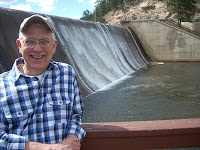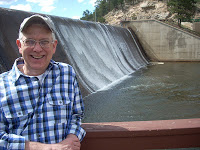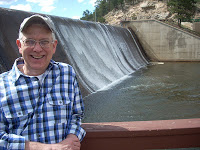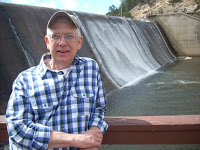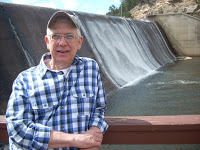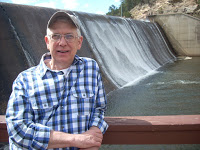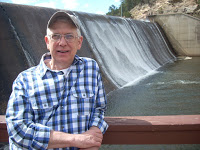My
parents lived truly hospitable lives. As a couple striving to live within the
Christian and biblical tradition, they entertained strangers and travelers. They
knew the stories of heavenly visitors that sometimes showed up asking for a
meal or a place to spend the night. They were familiar with the Old Testament
story of Abraham and Sarah’s visit by angels and the New Testament
interpretation that the same thing could still happen. They read the biblical commendations
of individuals and churches that welcomed travelling prophets and evangelists. In
their own time they lived out the spirit of those old stories and
interpretations.
They
also entertained their children. Of course that idea is not caught up in the
hospitality laws and traditions of Hebraic antiquity, for in Jesus’ teachings
there was no righteousness in taking care of one’s children or parents. Anyone
with dependants simply was responsible for the attendant burdens. Yet when I
contrast my parents’ providence and attitudes toward their children with what I
know happens too often in other children’s families, my parent’s home shines as
a place of true hospitality toward progeny, offspring who were treated as
persons not property. Our home went beyond the ancient values that treated
wives and children as a man’s chattels, for my parents treated one another
humanely and their children as well. They also treated other people as human
beings of value, and thus they related responsively to and responsibly toward
them. Surely such a distinction can be listed as hospitality, extraordinary
hospitality.
I
enjoyed a great upbringing in a hospitable home environment. So did Myrna, my
wife. Upon coming together, we saw our home as an environment for rearing
children and entertaining friends and strangers. Thus we accepted foster children
and “foster” adults into our home. For five years we entertained, as it were,
foster children when we served as a boarding home for the Kansas Children’s
Service League, a group I knew about due to my mother’s long-time support of
them. We also welcomed relatives and friends to live with us while they went to
school: Myrna’s sister who attended medical assistant school, a foster-daughter
of my sister’s who attended cosmetology school, our friend Ted who attended
graduate school, an old classmate Donna who likewise attended graduate school,
and friends of our son and daughter, kids who needed familial support in
various ways. We welcomed a friend of our son’s who as a young adult lived with
us for several months, and we welcomed a slightly crazy woman to live with us
for several more months, a woman who seemed always to be almost one inch from
living on the street. These experiences among many others kept our house lively,
taught the two of us strength, adaptability, and perseverance. Our home became
a crash pad, a loving support, an oasis, a place of cross-cultural learning, a
bed and breakfast, and the center of loving tolerance. The experiences changed
our lives, our perceptions of social reality, and our willingness to take
chances on other persons’ lives.
I
wonder then why we were unable to enfold my homosexuality into such an enduring
relationship and environment. Perhaps hospitality and homophobia don’t mix well
and the antipathy against homosexuality is too well institutionalized in western
society, too highly integrated into myths of otherness, sin, and transgression.
Both my wife and I were surprised at how quickly we moved towards separation
when details of my sexual truth became extrovert. We remain friends and when
together still wonder why we live separately. We are both hospitable; using our
separate homes to benefit others, and we are pleased that our children do the
same. Still the question lingers.
An
elderly minister and I once discussed the injunction in Matthew’s Gospel that
allowed for a church to kick out a member who would not act right. The wise man
pointed out that according to other good news passages such a sinner had to be
welcomed just like a brother or sister. But somehow, when homosexuality enters
the picture, there emerges a deep rift of disappointment, dirt, despicability, disrespect,
and dire detriment, enough so as to rip apart an intergenerational, long-standing
love and hospitality. Obviously marriages are not magic; nor is hospitality
uncomplicated.
Hospitality
must have been very difficult for Rafael’s mother, yet eventually she welcomed
me into her life on behalf of her dying son.
She
had to enter the home he shared with his gay American partner, a man her own
age.
She
had learned of her son’s homosexuality only about three months before when he
was in legal trouble. Then she learned that her eldest son was gay, he was ill
with HIV, and soon after that he was living with an American man.
Rafael’s
father was warm. His brother was warm. His sister was warm. I had to read body
language to understand those things. His mother was not mean, but she wasn’t
warm towards me. Some of what I understood about her I learned from her son.
She was not happy with the situation. It was against the church. It was against
all her dreams for her son and all the expectations she had held for her own
life. Sure her son had fathered a son for her, but he was supposed to stay with
his family, not run off to America and live with some gay man.
Rafael
told his parents they were welcome to stay at our home while they were visiting
him, but I was part of the deal. They were to be our guests. Of course, he
didn’t make it home until we were arranging home hospice for him. Then he
stayed less than thirty hours for when the home nurse tried to insert a
catheter to his bladder, she got blood. He had just been diagnosed with
full-term Hepatitis C.
Cultural
expectations were going to be a problem. I did housecleaning although I knew it
was women’s work. Once his father invited me to come sit with him. Of course we
could not talk. He wanted things to be as normal and proper as possible with
his wife and daughter doing the cooking and cleaning.
I
too was gracious and hospitable.
I
have received the hospitality of strangers.
I
have received strangers into my hospitality.
Home
life and hospitality.
Myrna:
Hospitality and generosity.
OT
traditions, NT traditions.
Users
and the hospitable, the foundation of a prejudice.
Hospitality
and spiritual dimensions of growth.
Pragmatic
considerations in hospitality.
Jesus’
words of hospitality—both to receive it and give it. Holy images.
Hospitals
Hostels
Hosts
Invitations
© 12 Mar 2013
About the Author
Phillip Hoyle
lives in Denver and spends his time writing, painting, and socializing. In
general he keeps busy with groups of writers and artists. Following thirty-two
years in church work and fifteen in a therapeutic massage practice, he now
focuses on creating beauty. He volunteers at The Center leading the SAGE
program “Telling Your Story.”
He also blogs at artandmorebyphilhoyle.blogspot.com
